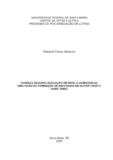| dc.creator | Santurio, Roberta Flores | |
| dc.date.accessioned | 2021-11-16T12:08:38Z | |
| dc.date.available | 2021-11-16T12:08:38Z | |
| dc.date.issued | 2020-06-19 | |
| dc.identifier.uri | http://repositorio.ufsm.br/handle/1/22796 | |
| dc.description.abstract | The present work investigates the critical view of Charles Dickens (1812-70) on the subject Education as presented in Oliver Twist (1838) and Hard Times (1854). The description of the Victorian experience of education, which finds its initial critique in Dickens's work, provides a glimpse of still-existing problems, including the relationship between education and sensitivity, education and authoritarianism, education and freedom. When we focus the analysis on the children and on the representatives of education, we realize that Dickens's pedagogical ideal, as presented in the two narratives, envisions a broad development of individuals, through democratic teaching methods. It is important to highlight that the term ‘democracy’ is not held as a form of government, but rather as an educational philosophy which includes both body and mind. Thus, in the dickensian view, a broad education which aims in the improvement of character, is the path which could lead us to a collective unity. However, as we analyzed, Oliver Twist, one of the author's first novels, is configured by the high level of idealization and is based essentially on Christian values. On the other hand, Hard Times is incisive in its criticism of the Utilitarian doctrine and attempts to a movement towards social action. Despite the differences in the tone of the narratives, both advocate for individual and social balance, depicting an author with gregarious principles. In order to articulate the values established in the nineteenth-century English educational process along with Dickens' social criticism, the analysis considers some ideas of Jeremy Bentham and John Stuart Mill, two of the leading utilitarian thinkers and philosophers active in the educational setting of the period. | eng |
| dc.language | por | por |
| dc.publisher | Universidade Federal de Santa Maria | por |
| dc.rights | Attribution-NonCommercial-NoDerivatives 4.0 International | * |
| dc.rights.uri | http://creativecommons.org/licenses/by-nc-nd/4.0/ | * |
| dc.subject | Crianças | por |
| dc.subject | Crítica social | por |
| dc.subject | Dickens | eng |
| dc.subject | Educação | por |
| dc.subject | Utilitarismo | por |
| dc.subject | Children | eng |
| dc.subject | Social criticism | eng |
| dc.subject | Education | eng |
| dc.subject | Utilitarianism | eng |
| dc.title | Charles Dickens, educação infantil e democracia: uma visão de formação de indivíduos em Oliver Twist e Hard Times | por |
| dc.title.alternative | Dickens, child education and democracy: the formation of individuals as an ideal in Oliver Twist and Hard Times | eng |
| dc.type | Dissertação | por |
| dc.description.resumo | O presente trabalho investiga a visão crítica de Charles Dickens sobre o tema Educação tal como representada em Oliver Twist (1838) e Hard Times (1854). A descrição da experiência vitoriana de Educação, que encontra uma forte crítica na obra de Dickens, permite um vislumbre de problemas ainda existentes, entre os quais as relações entre educação e sensibilidade, educação e autoritarismo e educação e liberdade. Quando analisamos os personagens infantis e os personagens representantes da educação, percebemos que o ideal pedagógico de Dickens, tal como exposto nas duas narrativas, contempla o desenvolvimento amplo dos indivíduos por meio de métodos democráticos de ensino, concebidos não como uma forma de governo, mas como uma filosofia educacional que contempla tanto o corpo quanto a mente. Assim, na visão dickensiana, a Educação abrangente, que tem como objetivo principal o aperfeiçoamento do caráter dos sujeitos, é o caminho para uma harmonia social. No entanto, conforme analisamos, Oliver Twist, um dos primeiros romances do autor, se configura pelo alto nível de idealização e está assentado em valores essencialmente cristãos. Já Hard Times é incisivo em sua crítica à doutrina Utilitária e ensaia um movimento de ação social. Apesar das diferenças no tom das narrativas, ambas advogam pelo equilíbrio individual e social, mostrando um autor com princípios gregários. A fim de articular os valores estabelecidos no processo educativo da Era Vitoriana, com a crítica social de Dickens, a análise considera algumas ideias de Jeremy Bentham e John Stuart Mill, dois dos principais pensadores e filósofos utilitários atuantes no cenário educacional do período. | por |
| dc.contributor.advisor1 | Pereira, Lawrence Flores | |
| dc.contributor.advisor1Lattes | http://lattes.cnpq.br/2329033954605102 | por |
| dc.contributor.referee1 | Rocha, Ronai Pires da | |
| dc.contributor.referee2 | Rosenfield, Kathrin Holzermayr Lerrer | |
| dc.creator.Lattes | http://lattes.cnpq.br/3310142068914358 | por |
| dc.publisher.country | Brasil | por |
| dc.publisher.department | Letras | por |
| dc.publisher.initials | UFSM | por |
| dc.publisher.program | Programa de Pós-Graduação em Letras | por |
| dc.subject.cnpq | CNPQ::LINGUISTICA, LETRAS E ARTES::LETRAS | por |
| dc.publisher.unidade | Centro de Artes e Letras | por |



